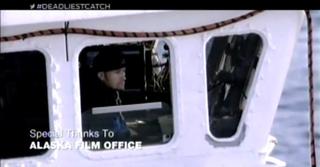Alaska Film Subsidy Draws Legislative Scrutiny

Friday, April 19 2013
If you watched the season premiere of "Deadliest Catch" this week, you might have noticed a line in the credits acknowledging the Alaska Film Office’s contribution to the show.
It wasn’t just a reference to the fact that the show is filmed in Alaska -- the note was included because the state actually subsidizes the popular reality television series through its film tax credit program. But if some state legislators have their way, that won’t be the case for much longer.
The Alaska Film Production Incentive was created by the state legislature in 2008 to do exactly what its name suggests -- encourage film production in Alaska. Dave Worrell runs the program for the state.
“Really, British Columbia was one of the first to effectively utilize an incentive program, and that’s one of the reasons they’ve essentially become ‘Hollywood North,'" Worrell says. "So many productions took advantage of their incentive that they were really able to build that industry from basically nothing. So, a lot of other jurisdictions, US states looked and that and thought ‘boy, we want our part too.’”
The way Alaska’s program works, production companies keep track of how much they spend on payroll, food, lodging and transportation while in the state, and then submit the totals to the Film Office. Worrell then uses those figures to calculate and issue tax credits, which the production companies can convert into cash by selling them to Alaskan companies with corporate tax liability.
“And typically they will sell that tax credit at some sort of a discount," Worrell says. "That can range between 70 and 90 cents on the dollar.”
Original Productions declined to comment on the tax credits, and the figures for this season of "Deadliest Catch" aren’t publicly available, but for Season 8, the company received $700,000 from the state, or 96 percent of their production costs, excluding non-resident wages. Of that, $7,000, or roughly 1 percent, went to wages for Alaskan residents.
Critics point to those kind of numbers as cause for concern. Representative Bill Stoltze, a Republican from Chugiak introduced a bill in the state legislature this year asking for an end to the program. In testimony to the House Commerce and Labor Committee he said it simply doesn’t pencil out.
“If we’re paying for something, I like to make sure it’s working, functioning, and really does have the benefits at a good cost-benefit ratio.”
Before renewing the program’s funding last year, the state legislature requested an audit to answer the cost-benefit question. The audit found that for every dollar spent on the subsidy, it generated two dollars in economic benefits. But Stoltze said in his testimony that the state is in worse financial shape than it was last year, and suggested the money would be better spent elsewhere -- or not at all.
“I would be happy with stopping the bleeding while we still have a good blood flow,” Stoltze said.
Stoltze’s bill to repeal the tax credit was still in committee when the legislature gaveled out on Sunday, but it will be back on the agenda during next year’s session.
Whatever the outcome of House Bill 112, "Deadliest Catch" fans shouldn’t worry. While Original Productions has accepted the proffered subsidy, the show was filming in Alaska long before the tax credit program came into existence, and if the 3.4 million people who tuned in to the season premiere this week are any indication, that isn’t about to change.




joshua tobin on Monday, April 22 2013:
i worked for a produstion company that made the (series, i think) "baby genius".
at the end of the shoot, they did not pay people. they up and left. many were left having worked many sixteen hour shifts and not paid for their time.
Brian on Saturday, April 20 2013:
The State of Louisiana, which has extremely generous "incentives," has found that they LOSE at last $6 for every $1 spent in their "incentive" program.
http://www.youtube.com/watch?v=_AziW8nBlBc